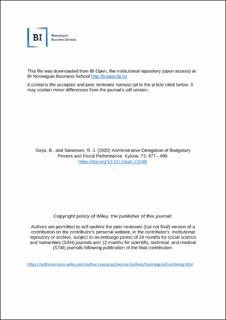Administrative Delegation in Budgetary Powers and Fiscal Performance
Journal article, Peer reviewed
Accepted version
Permanent lenke
https://hdl.handle.net/11250/2976561Utgivelsesdato
2020Metadata
Vis full innførselSamlinger
- Scientific articles [2181]
Sammendrag
Does delegation of the budget preparation process to top civil servants improve or worsen fiscal performance? We address this question by analyzing high-quality data on budgetary procedures and fiscal performance over a 25-year period in Norwegian local governments. This long time period allows exploiting substantial variation in budgetary procedures across time and space. The results show that administrative delegation decreases fiscal deficits as a share of current revenues. Compared to procedures relying on political coordination or the traditional ‘bottom-up’ procedure, deficits are approximately 0.3 percentage points lower on average under administrative delegation. Still, this effect is conditional upon the presence of minority governments and fails to materialize when the mayor enjoys majority support in the local council. Our results thus indicate that administrative delegation in budgetary processes may constitute an important tool to alleviate poor fiscal performance arising due to political coordination failures and weak political decision-making.
